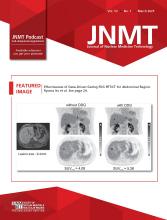Abstract
The process of radioiodine refractoriness, de-differentiation and development of TENIS (radioiodine [RAI] negative and elevated thyrogloblin differentiated thyroid cancer [DTC]) in metastatic differentiated thyroid carcinoma (DTC) could be viewed as a “disease continuum” rather than a single event or an “all or none” phenomenon. In this invited perspective, the important role of molecular functional imaging (MFI) in systematically exploring the disease biology and course of metastatic DTC is presented. Making this as the base, this report proposes a novel clinical classification for TENIS syndrome with a view of individualized treatment strategies using molecular functional imaging (MFI). Such endeavour, in authors' view, would aid in classification into subgroups and development of an individualized treatment strategy for each, thereby resulting in a personalized management model for patients of metastatic DTC. Case illustrations are presented that substantiate the viewpoint including the value of combined assessment in selected cases and the requirement of multi-pronged treatment approach for certain specific case scenarios. In addition to multiple other considerations, the authors believe that MFI based characterization of metastatic lesions could evolve as an important determinant for defining the optimal treatment strategy in patients of metastatic DTC and making the clinical management more rational and scientific.







